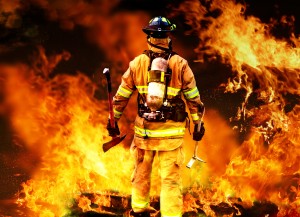(Photo borrowed from http://marvenwhidden.wordpress.com)
What is the problem?
In recent years fire departments have been faced with reduced budgets as many other services and businesses have. This has led to underpaid firefighters and under equipped departments. In 2011 the National Fire Protection Association provided the public with the Third Needs Assessment of the U.S. Fire Service, the assessment stated that, “51% of all fire departments do not have enough portable radios to equip all emergency responders on a shift”, “51% of all fire departments cannot equip all firefighters on a shift with self contained breathing apparatus (SCBA)”, and “Two out of five (39%) fire departments do not have enough personal alert safety system devices (PASS) to equip all emergency responders on a shift.” All of these pieces of equipment play an important part in allowing firefighters to do their job effectively and safely. If you are unsure of how these pieces of equipment are a key part in firefighters being able to do their job safely and effectively please visit the Santa Clara County Fire Department’s website. A recent article posted on Firehouse.com, Fire Service Grant Programs Face Reduction Under Obama’s Plan, talks about the new budget released for 2014. In the new budget two grant programs ,SAFER and FIRE act, would be cut by 10 million dollars. These grants are in place to help fire departments purchase new equipment. In a poll done by Firehouse Magazine in 2014 participants reported that 46% of their departments had put off buying new apparatuses due to economic conditions. Having the proper apparatuses during a call plays an important part in the firefighters being able to effectively put out fires. The proper funding for fire departments to buy new equipment, and support department needs, is not being provided at this time.
How does this effect the public?
Fire departments are the first responders in most situations. It is the duty of the fire service to protect and serve their community in the worst situations possible. When someone in the public is having their worst day ever, and their life is on the line, the first people to show up are the first responders, including the local fire department. Members of a community fully expect the best from their local department in medical emergencies and fire situations. Because of funding cuts some departments are no longer able to meet that expectation and provide the necessary services to their communities. In an online article, posted on Firehouse.com, on March 9, 2014, this becomes very clear. This article talks about a situation that occurred with the Placedo Volunteer Fire Department. On February 22, 2014 the department responded to a house fire where an 83-year-old women was trapped inside. However, due to lack of funding, the department was down to only one truck, a brush truck. Because of this the department did not have the capability to put out a house fire and all the department could do was watch and wait for another close department to respond. The woman perished in the fire. The woman’s life could have been saved had the department been equipped with a tanker truck. Another sad instance of this was in September of 2011 when the Detroit Fire Department responded to a house fire with a 3-year-old girl trapped inside. The only truck able to respond was also not equipped to put out a house fire.
Detroit firefighters carry the casket of Ivory Ivey during her funeral.
(Picture borrowed from CBS Detroit)
Detroit has been one of the cities hit hardest by underfunding due to the population loss and lack of support from other communities and the state. This tragedy was put in the spot light when it was covered in the documentary BURN. As you can see, these funding issues aren’t just the problem of the fire department, it is a problem that directly effects the public.
Why do firefighters deserve our support?
So setting our personal well being aside, what reasons are their, for us as a community, to support firefighters in what they do. This becomes a very big question when you start looking at how funding cuts have led to pay cuts for firefighters. Being a firefighter’s son I can personally say no firefighters I have met do the job for the money. Also, due to the low salary, it is very easy for me to think of firefighters who have a completely separate career, besides the fire service, to supplement their salary. In Mark vonAppen’s blog FULLY INVOLVED, he says “A select few people in the world have the privilege of helping people on the worst day of their lives. We do that.” For firefighters it isn’t about the money, it is a privilege for them to get to do what they do. In my dad’s words, “I have the best job in the world.” Firefighters do their job with a passion that is shown in very few other professions, but yet get very little monetary compensation for it. In a web article posted by Firehouse.com on October 13, 2012, it was shown that 52 firefighters had been working without pay for a full week while their fire department looked for ways to meet payroll. These firefighters showed immense dedication to their community while receiving no financial support from their community. In blog She’s Fully Involved the author says, “When the fire service became a part of my life, I quickly realized that a day marked on the calendar has nothing to do with the day we have to celebrate. You have to move things around. Plan ahead. Have early holidays, late holidays or sometimes…… skip holidays.” Coming from a firefighter’s family I know this to be completely true. For most families holidays are taken for granted as a day to spend time with family, but in firefighter families you live by the schedule, firefighters go to work every third day no matter what day it lands on. Firefighters and their families don’t deserve to have to make all of these sacrifices on a daily basis and yet still not know if they are going to be able to pay their bills.
How can this problem be fixed?
One of the easiest and fastest ways a community can help its fire department is through fundraisers. When schools and other group choose to do fund raisers, the local fire department is rarely if ever on the list of possible candidates for a fund raiser. This is one place that the raised money would directly effect the community as a whole, ESPECIALLY in smaller communities with volunteer departments. After the tragedy with the Placedo Volunteer Fire Department, as I talked about earlier, the community came together and in one day raised $4,000 toward a new fire truck. It may seem like a small amount toward a $150,00 to $200,000 fire truck, but every little bit helps. Especially if fund raisers like this were done multiple times a year. It would greatly decrease the amount the fire department has to get in terms of grants and other funding. Another answer to this same problem actually involves the Detroit Fire Department. As it was brought to the attention of other cities how under equipped and underfunded the Detroit Fire Department was, a program was put together to raise money for the city called the Detroit Mutual Aid Project, as talked about in the blog on my.firefighternation.com. This was many of the answers and responses to securing the funds for the Detroit Fire Department to be able to pay their firefighters and supply them with the necessary equipment to do their job safely. Another possible way for departments to reduce costs is through wellness program implemented department wide. In the article, Economic benefit of the PHLAME wellness programme on firefighter injury, the authors analyze the effectiveness of one wellness program, the PHLAME. In this article they state “For every dollar spent on health promotion, between 2.00 and 6.00 dollars are saved” and conclude, “This is a low cost, team-based, peer-led, wellness programme that may provide a feasible, cost-effective means to reduce firefighter injury and illness rates.” This shows us how effective and cheap wellness programs can be when implemented in fire departments. In the article An Examination of the benefits of health promotion programs for the National Fire Service the authors say, “health promotion programs focused on injury prevention and rehabilitation resulted in lower costs associated with injury-related workers compensation claims.” This also supports the claim that low cost health promotion programs can save money for fire departments. So, how does this effect the general public? Of course implementing these programs can most effectively be done within the fire department, however maybe this can be something that the community can get involved in also. In a community in need of cutting costs and looking at cutting fire department funding, it could be a possible option to push wellness programs into the fire department, through the city, as an alternative means to cutting costs long term and allowing the department to keep funding for vital equipment and payroll. The problem with this plan, it could however, involve a lot of push back from firefighters in general, so it does require firefighter’s cooperation to a certain level.
So where does that leave us?
Firefighting is a thankless and dangerous profession that is preformed by the most dedicated group of men and women you will find in the US. Firefighters make great sacrifices in their personal lives for the sole purpose of keeping their communities safe. As more and more communities are forced to make budget cuts, we as a nation need to take a look at the importance of our fire service and decide if that is really the best place to be cutting funding. We need to understand how underfunded fire departments directly effect our communities, and the firefighters, before someone in the community loses their life or a fire fighter doesn’t come home to his family due to worn out or even nonexistent equipment. When cuts need to be made to fire departments or funds can’t be gathered to support departments, communities need to come together to find alternative ways to fund the departments, or an alternative way to cut cost besides purely cutting funding, for the safety of our communities and the well being of our firefighters. We cannot afford to sit idly by while city councils and law makers use fire department funding as a way to cut costs. We cannot allow fire fighters to do their job without the proper equipment. You never know when it could be your worst day ever and the only people who can stop it are your local fire department.
Works Cited
“Fire poll: did your fd delay apparatus purchasing over the last three years because of tough economic times?” Firehouse Magazine Feb. 2014: 27. Business Insights: Essentials. Web. 20 Apr. 2014.
Kuehl, K S. (2013). Economic benefit of the PHLAME wellness programme on firefighter injury. Occupational Medicine, 63(3): 203.

